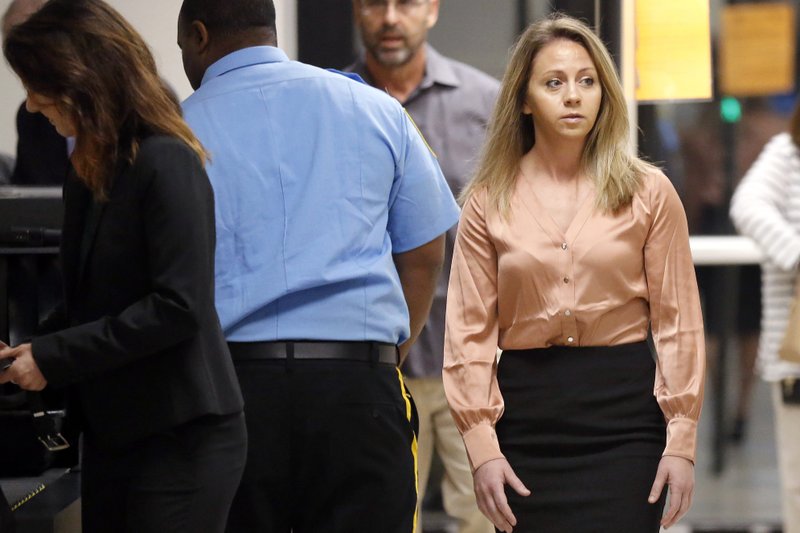DALLAS -- Last September, a white police officer shot and killed an unarmed black man in his own apartment. That much is settled.
But nearly every other aspect of Amber Guyger's murder trial for the killing of Botham Jean remains cloaked in controversy as opening statements in the case are set to start today.
For some, the shooting was a tragic accident. Others cite incidents of white officers killing black men that, they say, point to systemic problems in American policing.
A jury will ultimately have to reach consensus on whether Guyger committed murder, a lesser offense or no crime at all. As the trial begins today, one of the only points of agreement about her case in Dallas is that it has the potential to profoundly affect the relationship between police and residents.
Dr. Brian Williams, a trauma surgeon who was the former head of the city's police oversight board, called the trial a "flash point" that could significantly bolster or deeply damage public confidence in the police.
"This is an opportunity for Dallas to show that there is a way of handling these complicated and controversial issues of police use of force against minority citizens in a way that is fair and transparent and assures accountability for law enforcement," Williams said.
Guyger, 31, was off duty but still in uniform when she shot Jean, a 2016 graduate of Harding University in Searcy. She told investigators that after a 15-hour shift she confused Jean's apartment with her own, which was directly below his, and mistook the 26-year-old accountant from the Caribbean island nation of St. Lucia for a burglar.
Guyger said she parked on the fourth floor of her apartment complex's garage -- rather than the third floor, where she lived -- and found the apartment's door ajar, according to an affidavit.
Three days after the shooting, Guyger was arrested for manslaughter. She was subsequently fired from the Dallas Police Department and charged by a grand jury with murder.
Jean's family and other critics have questioned why Guyger was not taken into custody immediately after the shooting and whether race factored into her use of deadly force. In January, a judge issued a gag order barring attorneys in the case from speaking about it publicly.
Because of the shooting, Dallas residents of color feel "they can no longer be safe even in their living rooms," said imam Omar Suleiman, a leader with interfaith group Faith Forward Dallas. Some city residents expect Guyger will not face legal punishment and are preparing to respond, he said,
"That's very dangerous," Suleiman said. "If the community sees her walk free without any repercussions it's not just going to be your ordinary protest."
Legal experts say getting a murder conviction will be difficult in Guyger's case.
Heath Harris, a defense lawyer and former first assistant district attorney in Dallas County, said Guyger's attorneys are likely to argue that she acted in self-defense because she believed she was in her own home. The case may well hang on whether the jury thinks that was a reasonable mistake.
If the jury believes Guyger made a sincere error, then that means the shooting wasn't murder, said John Helms, a Dallas defense attorney and former federal prosecutor. But they could still find her guilty of manslaughter or criminally negligent homicide, which can also come with heavy sentences, he said.
Twelve jurors and four alternates were selected earlier this month to hear the case. The racial makeup of the jury hasn't yet been made public, although both lawyers said who is on the jury will be crucial.
"There are going to be some people who, I think, will feel natural sympathy to a police officer," said Helms. "And there are other people who will have a terrible mistrust of people who are in law enforcement."
The head of an organization that represents Dallas police said he hopes all parts of the city will respect the jury's verdict. But Dallas Police Officers Association President Mike Mata said he's nervous that outside "antagonizers" will use Guyger's case to try "to make a national statement."
Mata, a sergeant, called Jean's death a "very tragic accident" but said Guyger's prosecution has many officers worried that they'll face criminal charges if they use fatal force to defend themselves or others.
"They charged Officer Guyger with murder because they say she knowingly and intentionally pulled the trigger causing the death of another," Mata said. "Well, isn't that the definition of every police shooting?"
But even within the ranks of Dallas police, Guyger's case has sparked disagreement.
Terrance Hopkins, president of the Black Police Association of Greater Dallas, said he's quick to correct people who call Jean's death a police shooting.
"If you look at this thing as, Dallas officer shoots this guy, it's not that because she's not on duty," said Hopkins, a senior corporal. "She's not responding to a call. She's not pulling someone over on a traffic stop like we see in police shootings, right?"
But Hopkins acknowledged that many in Dallas don't see this distinction. He said, "No, they see white officer, black man."
Metro on 09/23/2019
